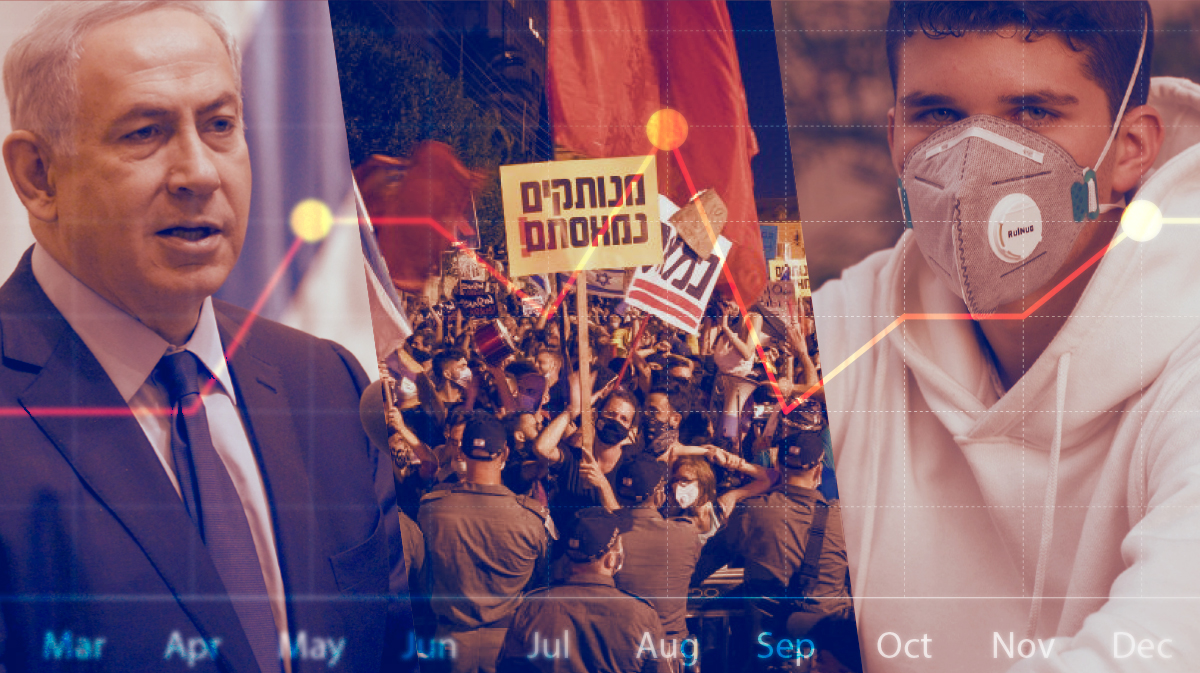Publications
Special Publication, September 29, 2020
A public opinion poll conducted in August 2020 by the Institute for National Security Studies (INSS) highlights several important social phenomena in Israel resulting from the Covid-19 pandemic. The most important is the lack of confidence among most of the public in the political leadership and state institutions, which presumably directly affects the public’s willingness to comply with the restrictions imposed on it. This finding is interrelated with the current political protest, unusual in scope and duration. According to the survey, the protest enjoys public legitimacy – and not only among the center and left of the political map – in light of the substantial damage, mainly economic, suffered by specific sectors of the Israeli public. The poll shows the depth of the social crisis, and to what degree social resilience in Israel has weakened. At the same time, it indicates possible directions for a more successful way of handling the overall crisis, with an emphasis on the political and social dimensions.
The rapid progression and spread of the Covid-19 pandemic highlight the need to make decisions under conditions of extreme uncertainty. Consequently, of particular importance in a democracy is the public’s degree of confidence in the state's leadership and institutions – a key to dealing successfully with the pandemic. It appears that the views of the Israeli public wield major influence, and hence are critical to decision makers. The opinion polls conducted in Israel since the pandemic began have sought to measure the public's views on the principal relevant issues, among them the attitude to the political leadership and state institutions, the anti-government protest, and feelings related to the personal damage from the crisis. To a large extent, the questions and the findings disclose what troubles the public and what its hopes and aspirations are at the time of the survey.
This article is based on a large public opinion poll conducted in August 2020 in the framework of the National Security Index, part of the National Security and Public Opinion Project at the Institute for National Security Studies (INSS). The survey was conducted among a representative sample of the adult population in Israel (age 18 and up) of 1,200 participants.[1] This article also cites figures from surveys by other research institutes in order to confirm the findings and assess important trends over time.
Attitude toward the State Leadership and Institutions
The attitude toward the political leadership and state institutions is examined in opinion surveys in various formulations, including with terms such as "functioning," "performance assessment," "confidence," and "trust" (in the sense of reliance, dependence). All of these terms address the public's sense of confidence in its leaders. The INSS survey focused on two central questions. One, "To what degree do you trust or distrust the various state institutions: the government, the Ministry of Finance, the Ministry of Health, the Knesset, the legal system, and the Israel Police?" The second question was more specific, focusing on the question of "culpability," or blame, for the Covid-19 crisis (failure to contain the infection and halt the overall crisis that emerged with the outbreak of the second wave). The respondents were asked to state the degree of blame on a scale of 1 to 4 (1 – completely blameless, 4 – highly culpable), that they attribute to each institution: the Prime Minister, the Ministry of Finance, the Ministry of Health, and the politicians.
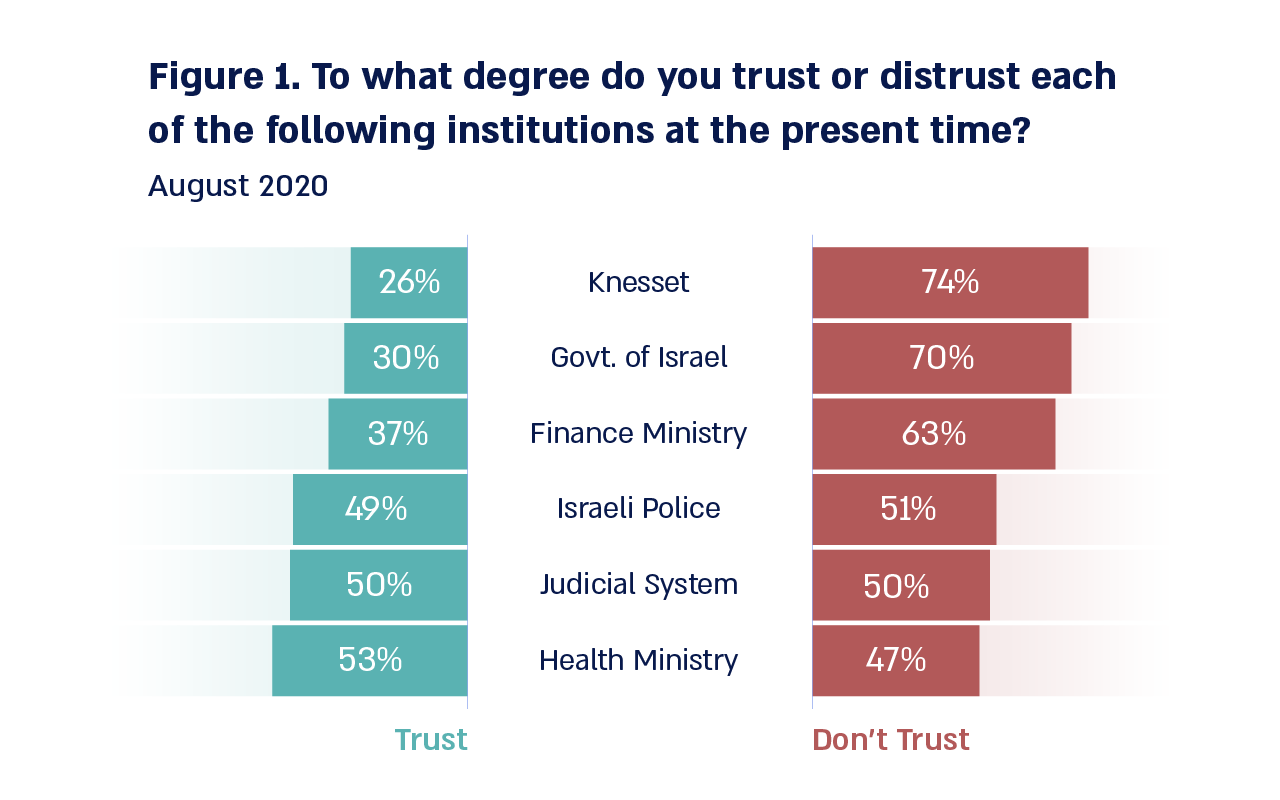
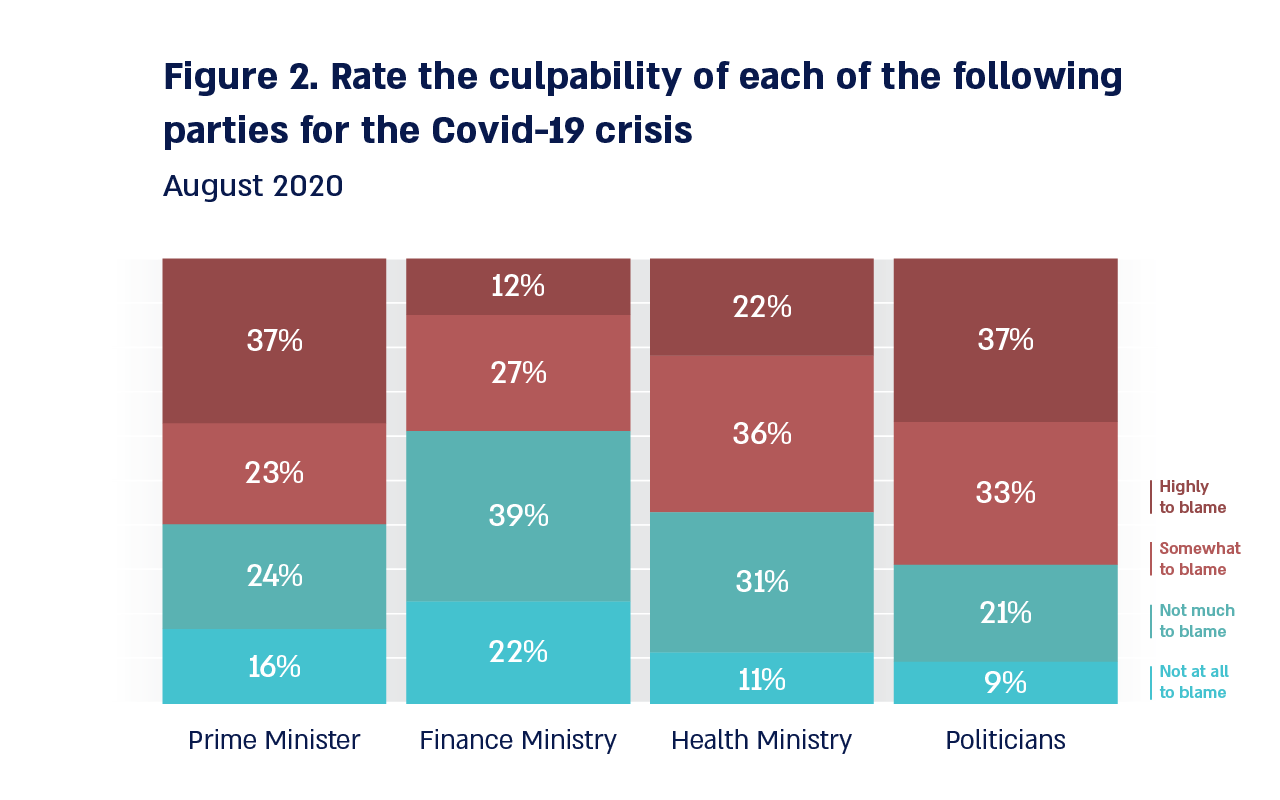
Figures 1 and 2 indicate that the public has almost no trust in the leadership and state institutions dealing with various aspects of the crisis. A large portion of the public also blames them for the crisis. At the same time, differences were found in the attitude towards the various institutions:
Israel Police: The public is divided with respect to the police, probably in the context of its enforcement of the restrictions imposed on the public in order to contain morbidity: 49 percent trust the police, while 51 percent do not. The result is similar to previous polls conducted by INSS in recent years: the IDF, the Mossad, and the Israel Security Agency have consistently been trusted more than the Police. Accordingly, the Covid-19 crisis has not substantially changed the public's attitude toward the Police with respect to its involvement in the enforcement of the regulations concerning the various restrictions on daily life and the protest demonstrations. However, in contrast to previous INSS studies, the current survey found no significant differences in the attitude toward the Police according to political affiliation, which could indicate a positive attitude toward Police activity during the crisis. Nor were significant differences found in the attitude toward the police between Jews and Arabs. This indicates a positive attitude toward the perceived contribution of police enforcement activity in Arab society.
Ministry of Finance: A majority of the public (63 percent) do not trust the Ministry of Finance, but a majority (61 percent) believe that it is not to blame for the economic crisis resulting from the pandemic. Arabs trust the Ministry of Finance slightly more than Jews (46 percent,, compared with 35 percent). Surveys by the Israel Democracy Institute show that the level of trust in the Ministry of Finance and the government professional economic staff fell from 48 percent in March to only 23 percent in July, indicating a sharp drop in trust in the Ministry of Finance from the first to the second wave of the pandemic. Presumably the public was influenced by politicians blaming the senior echelons, mainly in the Ministry of Finance; at the same time, the figures show a severe feeling of distress about the urgency with which the economic aspect of the crisis is addressed, as well as criticism of how the economy is managed during the crisis.
Ministry of Health: The public is divided concerning the Ministry of Health: 53 percent trust it, compared with 47 percent who do not. At the same time, more respondents (58 percent) believe that the Ministry of Health is culpable for its management of the coronavirus crisis. Interestingly, the level of trust in the Ministry of Health is slightly higher than in the Ministry of Finance, which the public holds to be slightly more culpable. It was also found that Arabs trust the Ministry of Health more than Jews (68 percent, compared with 51percent). These figures are consistent with surveys by the Israel Democracy Institute, which showed that confidence in professional medical staff fell from 63 percent in March to just 40 percent in July.
The political system: The survey examines the attitude towards politicians, the Knesset, the government, and the Prime Minister regarding their handling of the Covid-19 crisis. The attitude toward the political system is the most negative of all the institutions examined: a majority of the public distrust the government (70 percent) and the Knesset (74 percent). Similar figures were reported in a survey by the Central Bureau of Statistics. Furthermore, the public (70 percent) thinks the politicians are to blame for the Covid-19 crisis, and a large proportion (60 percent) of respondents hold the Prime Minister specifically culpable. A survey of August 19 by the Israel Democracy Institute also shows that the proportion of people expressing confidence in the Prime Minister is only 35 percent.
The Israel Democracy Institute found a higher level of confidence in institutions in general, particularly in the Prime Minister, when the pandemic began, especially during the first wave of the Covid-19 crisis (57 percent expressed confidence in the Prime Minister in April, compared with 29 percent in July and 35 percent in August). The stronger confidence in the political system in the spring is attributable to the sense of success in containing the pandemic that emerged toward the end of the first wave. It reflects public perceptions typical of early stages of security crises, expressed in "rallying around the flag." In contrast, the second wave of the pandemic and the socioeconomic crisis have sharply reduced confidence in the political system, due to the failure to contain the spread of the virus and the zigzagging in decision making.
Both the Central Bureau of Statistics surveys and the INSS poll show that Arabs in Israel trust the government, the Knesset, and the legal system significantly more than Israeli Jews, but have a lower level of confidence in Ministry of Finance and the Ministry of Health. Additional significant differences were observed according to political affiliation (for example, 9 percent of center-left voters responded that they trusted the government, compared with 28 percent of right wing voters – a surprising figure in itself. In addition, 17 percent of center-left voters responded that they trusted the Knesset, compared with 28 percent of right wing voters; 85 percent of center-left voters blamed the politicians for the crisis, and 81 percent blamed the Prime Minister, compared with 62 percent and 42 percent of right wing voters, respectively. At the same time, despite the differences between the right, center, and left, a majority of all three groups distrust the political system in Israel at the present time.
Views on the Public Protests
The drop in confidence in the Prime Minister among the public is also reflected in the many protest demonstrations in Israel, ongoing especially since the second wave of the Covid-19 crisis began. Respondents were asked to what extent they believe that the agenda in Israel can be or cannot be influenced in each of the following ways: elections, court petitions, and legal demonstrations and protests.
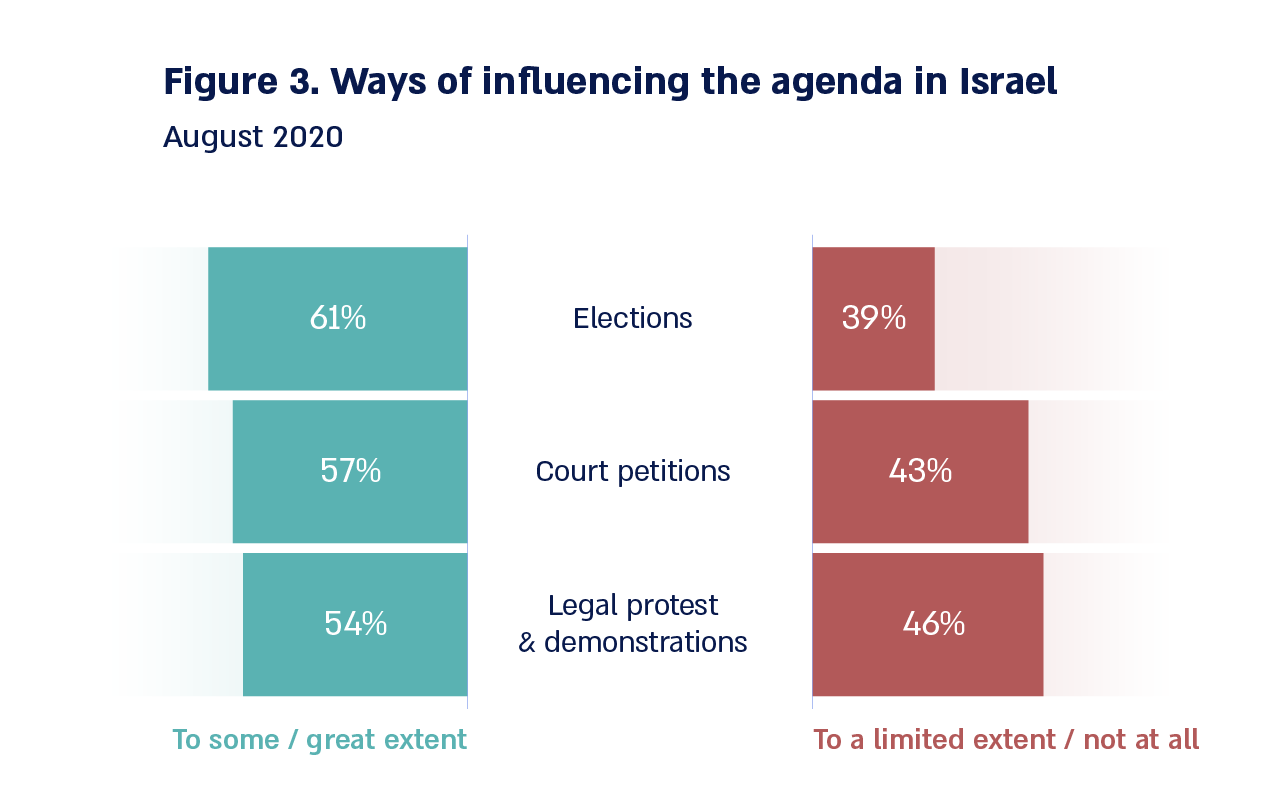
Figure 3 indicates that a large part of the public believes that the situation can be influenced through legitimate ways afforded by Israeli democracy, and believes in the traditional channels of influence.
Elections: 61% of the public believes that the agenda in Israel can be influenced through elections (30 percent to a great extent, 31 percent to some extent, 24 percent to a limited extent, and 15 percent not at all). No differences according to political affiliation were found.
Court petitions: 54 percent of the public believes that the agenda in Israel can be influenced through a court petition (17 percent to a great extent, 37 percent to some extent, 31 percent to a limited extent, and 15 percent not at all). Differences according to political affiliation were found, but even a large portion of those describing themselves as right wing said that this method was effective (right – 42 percent, moderate right – 50 percent, center – 63 percent, left – 63 percent).
Demonstrations and protests: 57 percent believe that the agenda can be influenced through legal demonstrations and protests (20 percent to a large extent, 37 percent to some extent, 29 percent to a limited extent, and 14 percent not at all). Differences according to political affiliation were also found, with a large portion of those describing themselves as right wing believing that it is possible to exert influence through demonstrations and protests (right – 37 percent, moderate right – 49 percent, center – 67 percent, left – 78 percent). More secular respondents believe in the possibility of change through this channel than religiously observant and ultra-Orthodox Jews.
Attitude towards Demonstrations against the Government
In view of the growing protest, respondents were asked whether or not they identify with the demonstrations against the government's policy. It was found that a large proportion (53 percent) identify with the demonstrations against the government, while 43 percent do not (4 percent responded that they did not know or chose not to answer). An analysis according to political affiliation shows large and predictable differences. While a large majority of the public describing itself as left wing or center (left wing – 90 percent, center – 75 percent) identify with the demonstrations, far fewer of the respondents describing themselves as right identify with the demonstrations (right – 24 percent, moderate right – 37 percent). At the same time, a third of the respondents describing themselves as belonging to the right side of the political map identify with the demonstrations, despite their anti-government nature and focus against the Prime Minister. The Arab community largely identifies with the demonstrations (65 percent).
A supplementary question showed that 42 percent of the respondents believe that in order to achieve change, the protests should be escalated, while 52 percent did not agree and 6 percent did not know or did not respond. A positive correlation was found between the responses to questions on this matter: a high proportion of those identifying with the demonstrations believe that influence can be exerted through them, and that they should be escalated. Differences according to political affiliation were also found on this point: 76 percent of respondents describing themselves as left wing supported escalation of the demonstrations, 56 percent of those describing themselves as center, 25 percent of those describing themselves as moderate right, and 22 percent of those describing themselves as right wing. The last figure apparently reflects some degree of disagreement among right wing voters on identification with the Prime Minister at a sensitive time vis-à-vis his public standing.
Attitude toward Violence as Part of the Political Protest
Most of the protest demonstrations are not expressly violent, even if a few events of a violent character have been observed. With this in mind, the public's attitude toward violence as a political tool was examined. A number of statements were presented, and the respondents were asked to say whether or not they agreed with them.
- "In the situation in Israel, violence in order to attain social or political aims is justified" – Most (85 percent) of the Jewish respondents did not agree with this statement. This finding is similar to the results of a survey before the Covid-19 crisis (84 percent in December 2019). The current survey found significant differences between Jews and Arabs (55 percent of Arabs agreed with the statement; 28 percent disagreed and 17 percent answered that they did not know or chose not to respond). This gap is interesting and important, because it is a possible indication of the feeling of exclusion and frustration among part of the Arab community and the degree of its commitment to democratic norms.
- "I am tolerant toward Israelis using violence to promote an idea in which they believe, if it is for the sake of what they regard as a better country" – A large majority (87 percent) of Jewish respondents disagreed with this statement. The figures are similar to an earlier survey conducted before the Covid-19 crisis (89 percent). There were also significant differences between Jews and Arab on this question (18 percent of Arab respondents disagreed with the statement, 63 percent agreed, and 19 percent answered that they did not know or chose not to respond).
- "It is legitimate for people to take the law into their own hands and use force against those demonstrating against the government" – A large majority (88 percent) of the Jewish respondents disagreed with this statement (compared with 47 percent of Arab respondents).
The survey findings indicate little support among Jews for violence and opposition to anarchy. There is no legitimization or tolerance for violence of any kind or under any conditions among any section of the Jewish public. At the same time, the possibility that a small minority that supports violence is liable to commit violent and provocative actions, thereby instantly changing the basis of public legitimacy for protest in its current form, cannot be ruled out. The attitude emerging here towards the Arab community is a warning signal.
Sense of Individual Damage from the Pandemic
The economic and social consequences of the Covid-19 pandemic have affected the public directly, which has had to accustom itself to a new and difficult routine. In order to assess the extent of individual damage, the survey posed two questions to the respondents. The first examined to what extent the respondents are anxious or not anxious about certain areas: health, economic affairs, security, and democracy. The second question examined the extent of individual damage on the levels of the economy, physical health, and mental health.
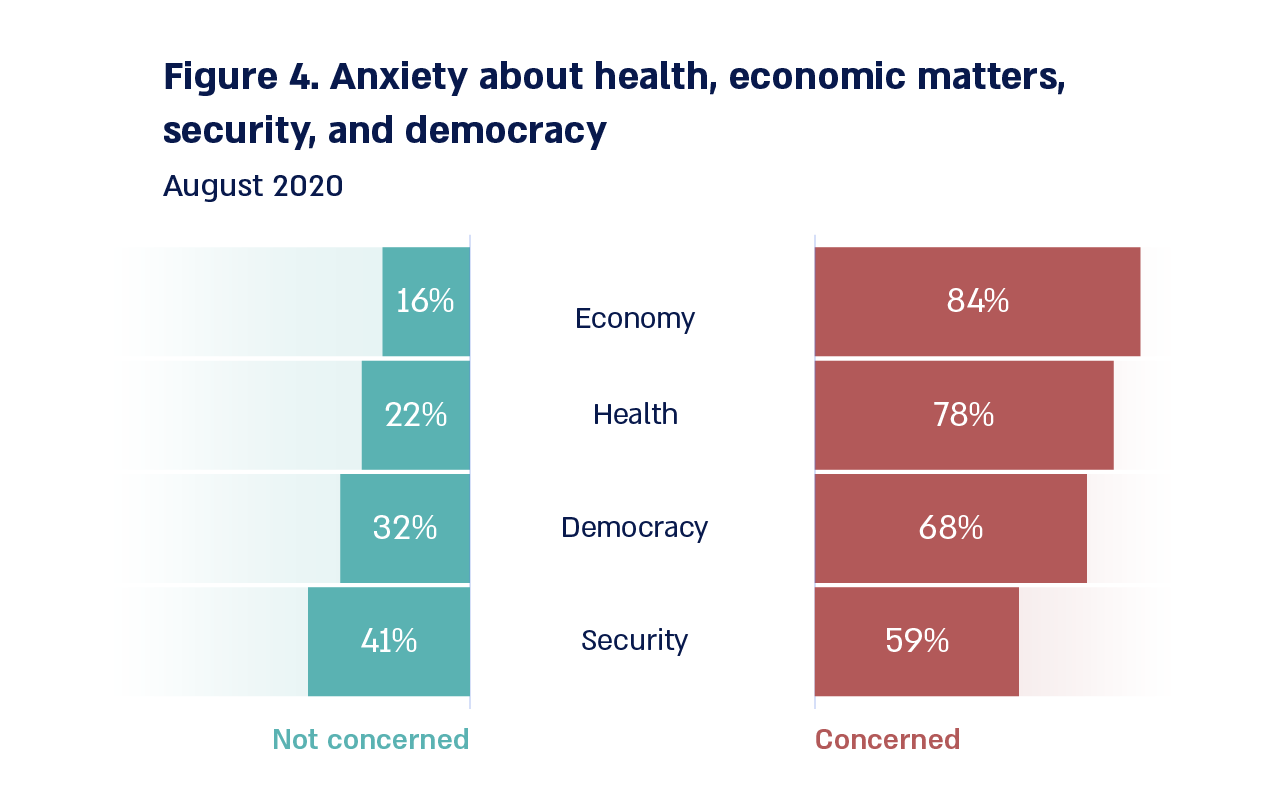
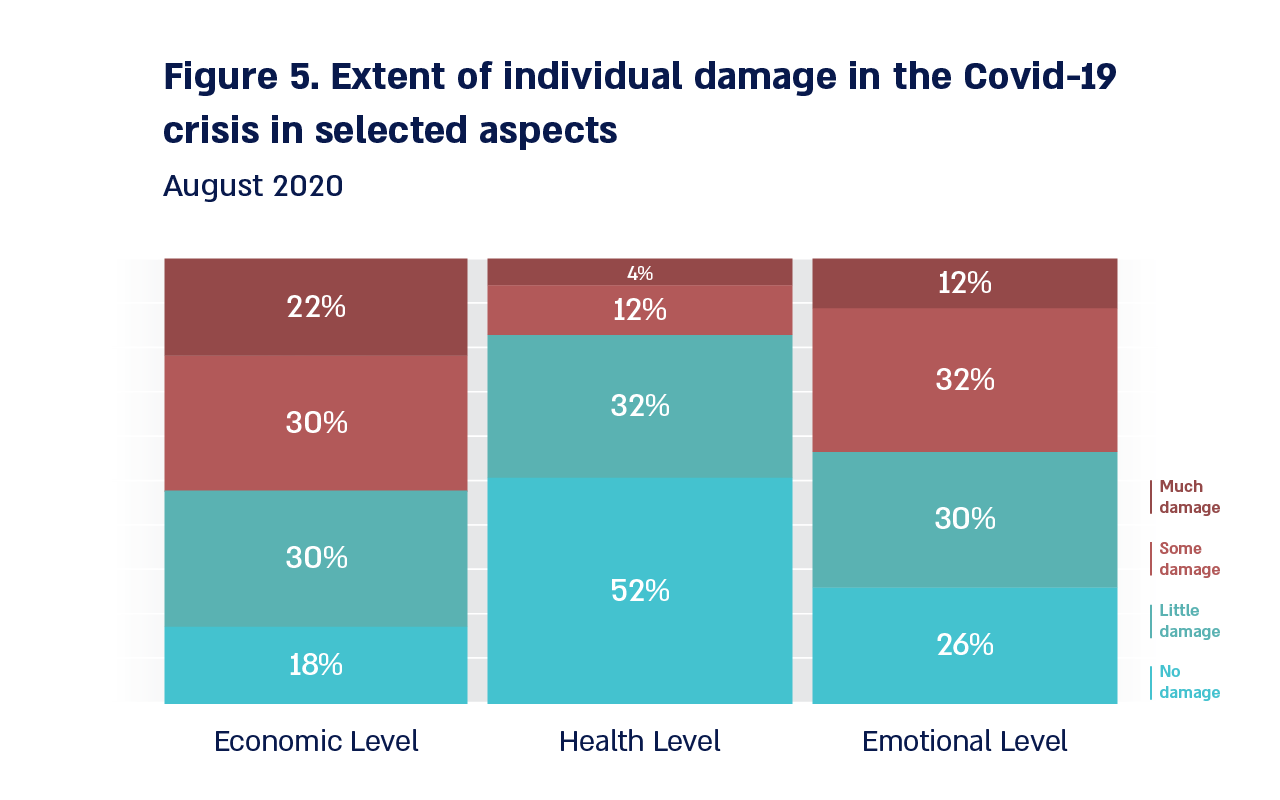
Figures 4 and 5 show that the public is very anxious about the Covid-19 crisis, and that it feels that it suffered fairly severe damage. Figure 4 indicates that the Israeli public is especially anxious about the economic aspect (84 percent), more than about the health aspect (78 percent). The public is also anxious about the democratic aspect (68 percent), probably in the context of the accompanying political crisis, which affects the handling of the pandemic. At the present time, the public is least concerned about the security aspect (59 percent). Arabs are slightly more anxious than Jews, mainly in the economic aspect (88 percent among the Arab public, compared with 78 percent among the Jewish public). Interestingly, the percentage of those anxious about the democratic aspect is also large among those describing themselves as right wing (right wing – 52 percent, moderate right – 55 percent, center – 84 percent, left – 93 percent), probably for different reasons than center and left wing voters.
One of the salient points in the survey is that the internal civilian threats in Israel are now perceived as more severe than the external security threats, even though the survey was conducted during a period of tension in the north. The findings underscore that the pressure felt by the public as a result of uncertainty in coping with the internal civilian aspects is greater. In a country in which security is the top priority, this finding is especially important. The latent message is that the public is currently severely disturbed about the pandemic and its consequences, and therefore may not be engaged by situations of security tension.
Responses to the second question, charted in Figure 5, help assess the extent to which the public feels damaged by the Covid-19 crisis. Clearly the public feels that the economic damage is the most significant, followed by the emotional strain: 52 percent said that they had suffered economically from the crisis, 44 percent said that their mental health had suffered, and only 16 percent said that their physical health had suffered (a high percentage in comparison with the quantitative data for the number of people infected with Covid-19). These figures are consistent with surveys by the Central Bureau of Statistics. Clearly certain groups in Israel have been affected more than other groups, both in their health and economically. For example, a comparison of Jews with Arabs shows that Arabs were more affected: 83 percent of Arabs reported having been affected by the economic crisis, compared with 46 percent of Jews; 36 percent reported that their health had been affected by the crisis, compared with 13 percent of Jews; and 63 percent reported that their mental health had been affected, compared with 40 percent of the Jewish public.
The findings indicate that there are no significant differences according to political affiliation with respect to individual damage from the crisis. On the other hand, significant differences in economic damage emerge with respect to the respondent ages (for example, 63 percent of young people up to age 24 said that they had suffered damage, compared with 30 percent of those over 65). Differences were also found with respect to income (for example, 59 percent of lower than average incomes were damaged by the economic crisis, compared with 28 percent of those with above average incomes), and with respect to education (54 percent of those with 12 years of schooling or less said that they had been affected, compared with 43 percent of those with post-high school or academic education). These figures illustrate an important fact – as a rule, the more disadvantaged population groups suffer more damage in crises than population groups that are better off. A supplementary question about employment situations in light of the crisis revealed that while the employment situation of a majority of the public (62 percent) had not changed, a sizable portion, nearly 40 percent, said that their situation had worsened (9 percent reported that they were currently jobless or were obliged to close a business, 7 percent reported that they had been put on unpaid leave, and 22 percent reported that their work hours had been cut back). Here too, the older respondents sustained fewer changes in their employment situation.
Finally, concerning damage to mental health, significant gender differences emerged. It is clear that women's mental health was more affected than men's (48 percent, compared with 31 percent). This figure is typical, as women are more inclined than men to admit the existence of emotional pressure.
In conclusion, the INSS survey was designed to examine the current mood in Israeli society during the second wave of the Covid-19 crisis. The survey results lead to several conclusions.
- Most of the public does not trust the political leadership and the state institutions. A large portion also assigns the government blame for the Covid-19 crisis because of what is perceived as ongoing failure in dealing with the overall situation. This signifies a challenging crisis of confidence between the public and the government, which presumably affects the extent to which the public is willing to comply with the restrictions imposed on it as part of the effort to reduce the mounting morbidity. This is probably one of the main reasons why large sections of the public do not take personal responsibility or take the necessary measures to protect themselves from the virus. Likewise the government apparently does not trust the public to behave in a way that will reduce morbidity. This lack of confidence is likely the underlying reason for the failure in this ongoing and difficult campaign. Until this lack of confidence is redressed – and the government bears responsibility for this trend – Israel will have difficulty stopping morbidity and emerging from the crisis (as long as no vaccine or cure for the virus is found). An open and transparent dialogue between the government and the public, and accurate explanations directed at various groups, stand to contribute immensely to renewed and essential confidence building.
- Against this, it appears that the questionable performance of the political-public system in Israel and the style of government featured in the current crisis is directly related to the political protest, which is exceptional in its extent and duration. The survey shows broad public legitimacy for the protest, and large sections of the Israeli public believe in the possibility of acceptable ways to change the agenda in a democratic country. Although the figures indicate that there is a political bias in this sensitive area, the survey shows that significant numbers of right wing voters also share this critical attitude, as long as the protest and demonstrations do not become violent, which a decisive majority of the Israeli public regards as unacceptable.
- The findings show that the Covid-19 crisis has significantly damaged large sections of the Israeli public. Most of the problem lies in the economic sphere. The survey indicates that the economic damage is in the national economy, and also disproportionately affects certain population groups. The crisis is therefore an event that requires differential handling. Distinguishable groups, mainly those that were disadvantaged to begin with, as well as newly affected groups from the middle class, have suffered more severe direct damage than other groups. Helping these groups must thus be a top priority, with a balanced and long-term view for the national economy.
- Presumably the overall crisis has shattered Israel's self-image about its economic and social resilience. It appears that the crisis has exposed the basic obstacles in Israel's capabilities for dealing with a severe and prolonged civilian crisis, as well as the wide gap between the external trappings presented to the public and the difficult barriers within the public systems.
- Finally, the importance of figures: the current crisis has proven how difficult it is to formulate policy without a solid, reliable, and agreed data base. Surveys of the kind analyzed here are essential raw material for shaping understanding of events in Israeli society. This survey also points out several major weak points in national policy during the crisis. A carful, meticulous state approach to issues, such as the question of mutual trust; relations between the state and society; and a differential attitude to the various groups, with disadvantaged groups being given priority, must rely on data that is transparent and available to the general public.
[1] The survey combined an internet questionnaire and telephone interviews among population groups lacking internet access. The maximum sampling error for the entire sample is ±3.7% at a 95% level of confidence. The survey was conducted in cooperation with the Midgam opinion polls company.



